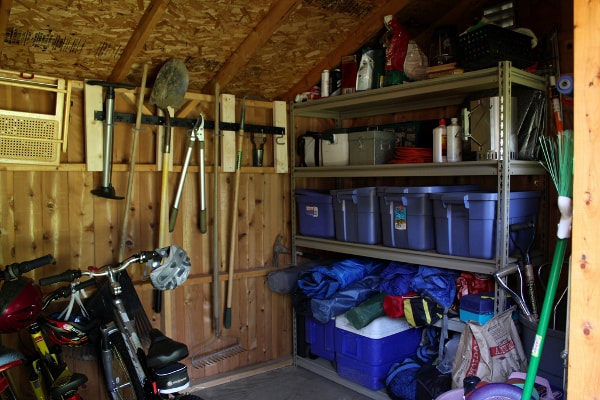If you have a garden shed or a dedicated spot somewhere in the house or the garage, you must count yourself lucky, because many of us don’t and we have to make do with any old storage option. If the latter is the case, the trick is to keep the mucky bits somewhere out of the way, while still grouping things together as much as possible: you don’t want the sandy boots and dirty gloves anywhere near your silk underwear, right? Let’s take a look at garden sheds, the most glorious option of them all. In theory, a shed can hold a lot of stuff and the basic idea of such a shed is to use if for gardening tools and materials like flower pots in waiting, bags of earth, sand or mulch, the hose, a lawnmower, cutting and pruning shears, diverse knives and saws, seeds and seedlings, plants waiting to be placed outside, stuff to keep the weeds at bay and the pests away. Does this sound like a lot? In fact, it’s surprising how much you will accumulate if you are serious about your garden. What’s even more surprising, though, is to see how much we accumulate and don’t actually use after the first time! Like any other place in the home, a garden shed needs sorting out regularly… far more regularly than most people think and practice. If you own a garden shed that you use to store garden tools – and believe me: there are many things in garden sheds that really don’t belong there! – it’s likely you have a lot of things that seemed like a good idea to add at the time, but have not had much use after that. Of course, there are things that you only use occasionally, like bags of soil for potted plants, sticks to hold up young plants, netting to keep the birds away, etc. I’m thinking about gadgets, tools used for one particular type of work and nothing else, and similar … the kind of stuff that ends up in the dark corners and behind other things. You know: out of sight, out of mind. The trouble with a shed is that it usually is nothing more but that: a shell with a door to keep stuff out of the rain. If you are lucky, you’ll have installed a couple of shelves and hooks to hang things on, but the vast variety of shapes and sizes of the things that need to go in there often makes many a shed not quite as useful as it could be. Why is that? Well: sheds, by their nature, are outdoors. This means that a lot of dust, dirt, and rubbish quickly assembles inside. Usually sheds are not watertight and always let the wind in, that means often birds nest inside, small animals, bugs and spiders make it their home, and stuff gets grimy in no time at all. Furthermore, a lot of stuff has strange shapes (rakes, brushes, cutters), or is relatively heavy (lawnmower, diverse implements) or have no stability whatsoever (water hose). If you own a couple of those you’ll know that rakes tend to keel over and hook into anything they touch, lawnmowers are ALWAYS lodged behind some new arrival thing, and water hose NEVER stays untangled for more than 10 minutes. All of this is not even taking into account that the shed is apparently the perfect place for any family member to plunk down stuff they don’t need right now without properly folding or putting back in its proper place. Remember that time the kids emptied the blow-up pool and stuck it into the shed without letting the air out? Once again, out of sight, out of mind. Remember? There are a few things to keep in mind when you own a shed:
But the most important lesson with regards to garden sheds is this one: they are NOT a final resting place for stuff that has no place in the house. If something is no use in the house, it should be disposed of, not stored for eternity. If you have enjoyed reading this, you may find these other articles interesting: Comments are closed.
|
Ask the ClutterMeisterIdeas to help clear away the mess in your homes and in your minds.
Feel free to share any of my posts, but please put in a backlink to the original blog post. Thank you. The author
Hi, my name is Tilo Flache. My mission: help clients declutter mind and space.
This blog contains pointers for your journey towards a happier living experience. Archives
November 2023
|




 RSS Feed
RSS Feed




